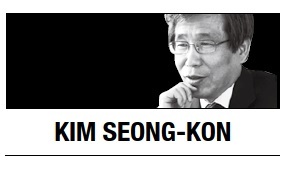
These days some of our newspaper articles and columns diagnose that we have failed in three critical areas: national defense, diplomacy, and education.
Others maintain that we have also not succeeded in boosting the economy, creating enough jobs, and checking the influence of labor unions. They also lament the chauvinism and child abuse that is still rampant in our society. If these critiques are valid, South Korea is in crisis.
The newspaper columns argue that our national defense strategy has failed because we have poured astronomical amounts of money into developing or purchasing conventional weapons that will be useless when confronted with North Korea’s nuclear bombs. They also criticize our diplomacy that has been disappointingly inept in navigating the political vortex swirling between China, Japan and the U.S.
The reporters and columnists contend that our educational system is a failure as well, due to the problematic system of the college entrance exam that forces our students to focus solely on studying until they are completely burned out. They also point out that our schools have regrettably turned into political arenas for ideological warfare between the left and the right.
Recently, a foreign columnist argued that the notoriously militant Korean labor unions are seriously undermining the Korean economy. Unfortunately, labor union leaders often turn their economic issues into political agendas and organize violent rallies to topple the government. In that sense, the recently bankrupt U.S. city Detroit, which had strong labor unions, could be a mirror that reflects the future of South Korea unless the minds of our union leaders radically change.
Columnists also deplore the shameful situation in which some children are abandoned or, worse, beaten to death by their parents who think of them as property.
Perhaps the most disheartening failure of South Korea is the division of the society into two antagonistic groups: the left and the right. When North Korea threatens the South with its nuclear weapons, the people of the South should protest in unison.
Alas! South Koreans are divided into pro-North Korea and anti-North Korea factions, antagonizing each other even in times of crisis. Simply surf Naver and Daum, and you can see how sharply South Korea is split into the rightists and the leftists. If this kind of ideological civil war continues, South Korea is doomed to collapse.
We cannot blame the Park administration for all of the above-mentioned problems, because many of them are chronic diseases of our society, inherited from previous administrations as an undesirable legacy. Besides, our diplomacy is now in the right orbit, having taken strong measures against the North, and so is our national defense by openly declaring that South Korea would bring in the Terminal High Altitude Area Defense system from the States. As for the economic recession, it is a worldwide phenomenon.
The problem is that these days, pessimism and defeatism seem to pervade in our society and spread like a highly contagious endemic disease, especially among young people.
Indeed, these days, you can frequently hear young people muttering, “I give up. There’s no hope.” You can also hear the youngsters complaining, “I don’t have a rich Dad. The die is cast. No matter how hard I try, I cannot climb up the ladder of social mobility.”
You can often hear in Korean society the following too, “Only those who are from a rich family can speak English well and earn high scores in TOEIC or TOEFL.” However, the truth is that this kind of negative determinism, rather than their unfortunate predicament, is what actually hampers their success.
In Hemingway’s “The Old Man and the Sea,” the unlucky old man says to himself: “But man is not made for defeat. A man can be destroyed but not defeated.” Unfortunately, today’s Korean young men seriously lack the defiant spirit of the unvanquished and undefeated. A man is not supposed to blame his family, society or the government for his plight. If he does, he is not a man.
The old man’s young apprentice Manolin says, “I’ll bring the luck by myself.” Now, that is the spirit we need to have. A man does not expect someone to bring him luck.
Yet our youngsters whine, “I have no luck. I’m not from a rich family.” Instead of blaming his parents for his unluckiness, a man should try to bring his luck by himself.
“The Old Man and the Sea” ends with the following: “The old man was dreaming about lions. Here even an old man is still dreaming. If a young man has no dream, what can you expect from him?
Fortunately, South Korea is a country of resilience and creative energy with so many gifted people. We have succeeded in many areas and we are proud of it.
We do not need to denigrate our abilities or accomplishments. We should overcome the air of defeatism and pessimism that is cancerous to our society. We may be destroyed, but we will not be defeated!
By Kim Seong-Kon
Kim Seong-kon is a professor emeritus of English at Seoul National University and the president of the Literature Translation Institute of Korea. — Ed.

